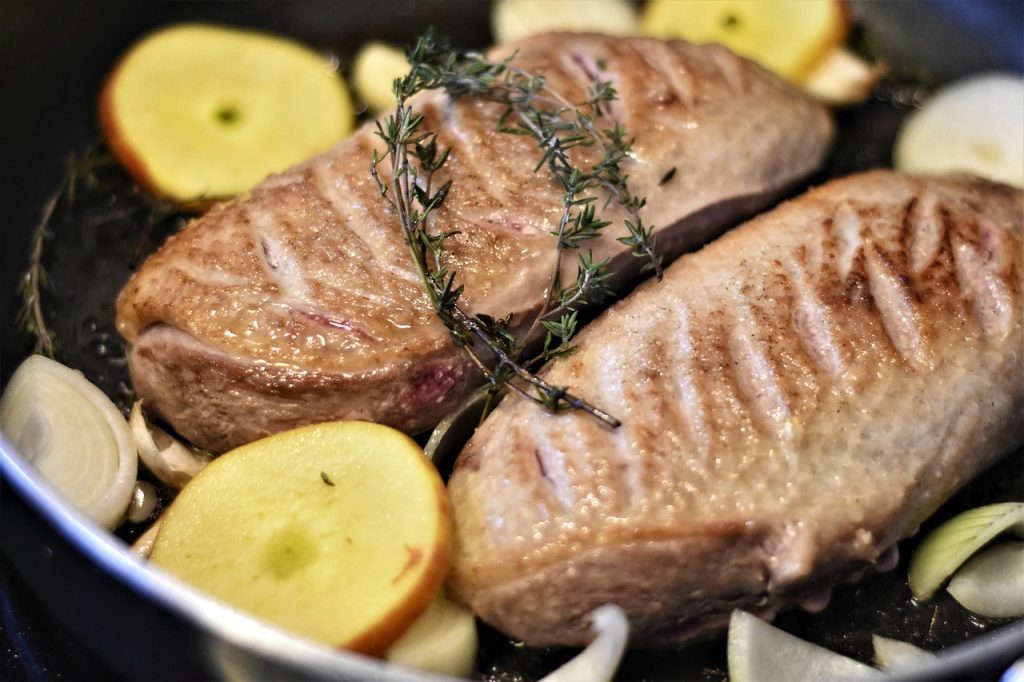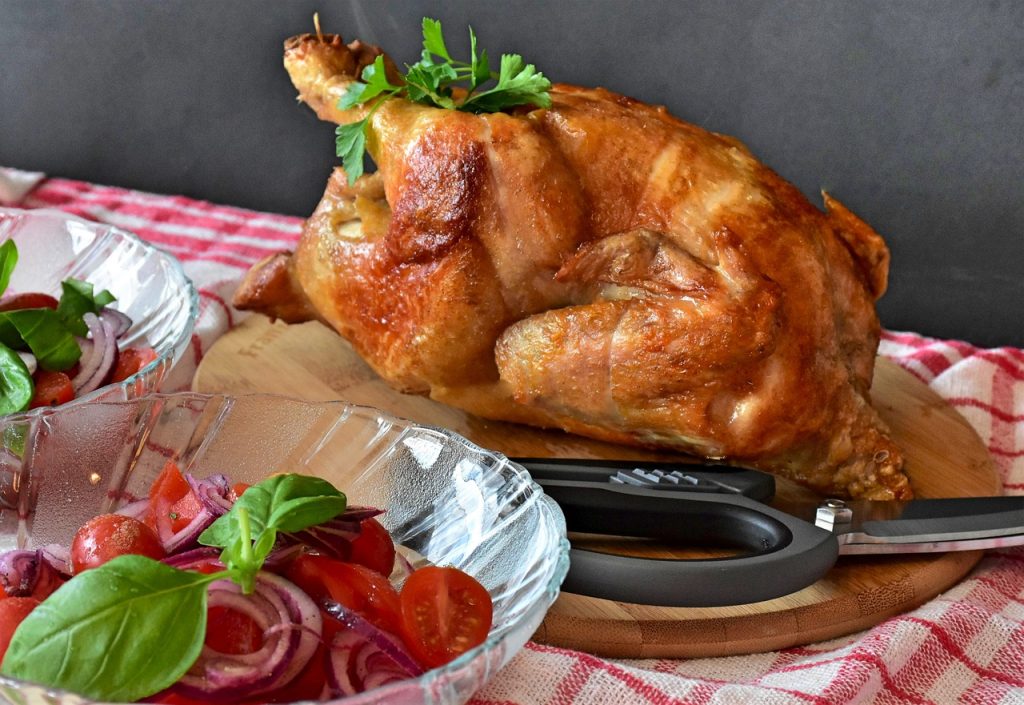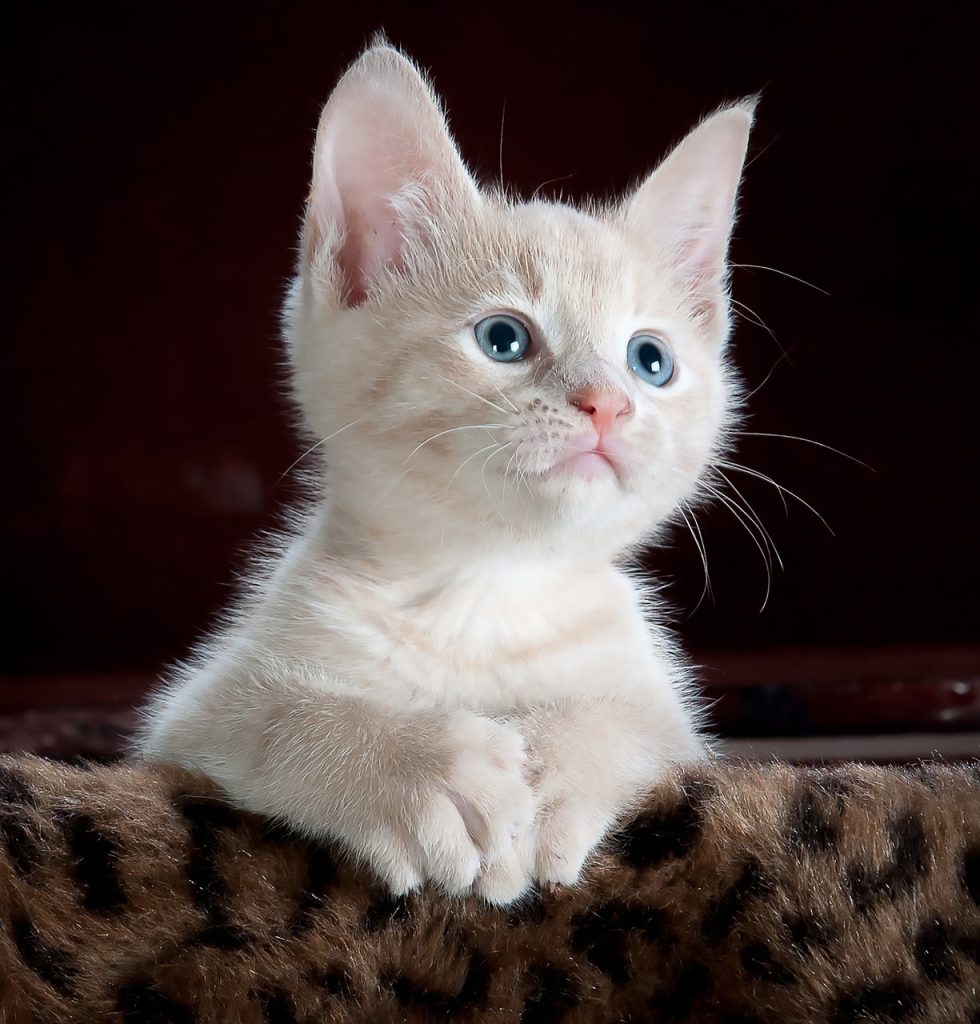The big, delicious bird on the table (that’s the turkey!) might look yummy and smell amazing, but trust me (your feline friend), it’s best left alone. My real happiness comes from things like playing with yarn and enjoying my favorite pate! can cats eat turkey safely?
Can Cats Eat Turkey?
Since cats are obligate carnivores, meaning they need meat in their diet, turkey meat that’s simply cooked is a delicious and safe option for them in small amounts. The key is keeping it plain. Avoid any seasonings or added ingredients, as these can upset your cat’s stomach.
Skip the turkey skin too, as it’s high in fat and can lead to digestive issues. Pre-cooked turkey and processed lunch meats are also off-limits because they often contain ingredients that can be harmful to cats.
If you’re unsure about offering raw turkey, it’s always best to err on the side of caution and cook it thoroughly. Before offering your cat a bite of your turkey feast, start with a small amount to see how they tolerate it. Remember, treats like turkey should only make up about 10% of your cat’s overall diet. Their regular meals should be a high-quality cat food that provides all the essential nutrients they need to stay happy and healthy.

Can Cats Eat Raw Turkey?
Cats can eat small amounts of raw turkey, but it’s not recommended as their primary diet. Raw meat may contain harmful bacteria like Salmonella or E. coli, which can cause food poisoning. While cats’ digestive systems are adapted to handle some raw meat, it’s safer to avoid the risk. Read Also can cats eat cherries
If you choose to feed your cat raw turkey, ensure it’s fresh and from a reputable source. Always wash your hands and surfaces thoroughly after handling raw meat. It’s best to consult with your veterinarian before introducing any new foods to your cat’s diet, especially raw meats.
Can Cats Eat Cooked Turkey?
Cooked turkey can be a safe and healthy treat for cats when given in moderation. It’s a good source of protein and can be easily digestible for most felines. Make sure the turkey is plain, without any seasonings, oils, or additives that could be harmful to cats.
Remove all skin and bones before feeding. Cooked turkey should only be an occasional treat and not replace a balanced cat food diet. Always introduce new foods gradually to avoid digestive upset.

Can Cats Eat Turkey Bones?
Uh oh! Turkey bones might seem like a fun chew toy for your cat, but they’re a big no-no. Here’s why:
- Sharp Shrapnel: Cooked bones turn brittle and splinter easily. These pointy bits can become choking hazards or injure your cat’s mouth, throat, or even their digestive system if swallowed.
- Tooth Trouble: Raw bones may seem softer, but they’re still too tough for kitty chompers. Chewing on them can lead to broken or chipped teeth.
- Block Party Blues: Bone fragments, cooked or raw, can cause blockages in your cat’s intestines. This is a serious medical situation needing a vet visit right away.
Can Cats Eat Turkey Skin?
That crispy turkey skin might be calling your cat’s name, but resist the urge to share! Here’s the deal:
- Fat Overload: Turkey skin is packed with fat. Regular binges can lead to weight gain and even pancreatitis, a nasty inflammation of their pancreas.
- Lean and Mean Machines: Cats are built to thrive on lean protein, not greasy treats. Their bodies just can’t handle the richness.
- Hidden Hazards: Cooked skin can harbor sneaky dangers like seasonings or oils, which can upset your cat’s stomach. Even the richness itself can cause digestive woes like vomiting or diarrhea.
- Tiny Nibbles, Big Risk?: A small bite of plain, unseasoned skin likely won’t cause immediate harm, but why risk it?
Can Cats Eat Turkey Bacon?
The aroma of sizzling turkey bacon can be enough to turn any kitty’s head. But while you indulge in that delicious breakfast treat, resist the urge to share with your feline friend.
Here’s the whisker-licking truth: turkey bacon, though not toxic, is packed with ingredients that wreak havoc on a cat’s delicate system. The high amounts of salt, preservatives and fat can lead to serious health problems like high blood pressure, heart issues, and weight gain in the long run.
Remember, cats are obligate carnivores. Their bodies crave meat, but it needs to be the right kind. They’re built to process lean proteins, not the processed concoction that is turkey bacon. Reac Also can cats eat fish
So, how can you show your furry companion some love? Ditch the turkey bacon and opt for small portions of plain, cooked turkey meat. It’s a purr-fectly healthy and satisfying treat that won’t put their health at risk.
Can Cats Eat Turkey Liver?
Turkey liver turns out to be a delightful and nutritious treat for your cat!

Packed with a whopping 18 grams of protein per serving, it’s a nutritional powerhouse. This organ is also rich in vitamin A, crucial for healthy vision, skin, and reproduction in cats. The high biological value means your cat’s body easily absorbs the good stuff. No wonder it’s a popular ingredient in top-notch cat food!
Just keep in mind, moderation is key. While a delicious treat, too much vitamin A can be harmful. Stick to offering small, cooked portions of turkey liver occasionally to keep your cat healthy.
When Can Kittens Eat Turkey?
Those tiny meows might melt your heart, but hold off on the turkey for your three-week-old kitten! Their little tummies aren’t ready for grown-up food yet.
In these early weeks, momma cat’s milk is nature’s perfect fuel for your fuzzy friend. It’s packed with everything they need to grow big and strong.
No mama cat around? No worries! Kitten milk replacer (KMR) is a lifesaver. This special formula mimics momma’s milk and is the only food your kitten needs until they’re about three weeks old. Don’t forget fresh water too!

Once your little furball hits the three-week mark, their eyes will be wide open and those first sharp teeth will start poking through. This is a sign their bodies are getting ready for some solid food, but turkey isn’t quite there yet. Kitten food, specially designed for delicate digestive systems, is the best first step on their journey to yummy grown-up meals.
How Much Turkey Can Cats Eat?
While turkey can be a healthy occasional treat for cats, it’s all about moderation. Treats, including turkey, should make up no more than 10% of your cat’s daily calorie intake. Their main source of nutrition should always be a high-quality cat food that meets their specific needs.
Here’s a handy trick to gauge portion size: think thumbnail-sized pieces. That’s about the right amount for most cats to enjoy without going overboard.
Of course, every cat is an individual. If your healthy cat accidentally gets into some extra turkey, don’t panic. A small amount likely won’t cause any harm. But if your cat has underlying health problems, has eaten a significant amount of turkey, or you’re concerned for any reason, it’s always best to consult your veterinarian for advice.
Health Benefits Of Turkey For Cats
As obligate carnivores, cats need a lot of protein in their diet. Protein isn’t just for building and maintaining muscles, it also helps keep them feeling full for longer periods. This can be especially helpful if your cat tends to be a snacker between meals.
Turkey is a great source of protein and is naturally low in fat, sodium, and sugar. This makes it a healthier alternative to high-calorie, fatty treats that can contribute to weight gain. Plus, the low sodium and sugar content help reduce the risk of health problems like diabetes and heart disease in cats.
Here’s a quick breakdown of some key nutrients found in turkey:
- Protein: 6 grams per serving (helps build and maintain muscle, keeps them feeling full)
- Vitamins B3, B6, B12: Important for energy production and overall health
- Selenium (like Vitamin E): Supports a healthy immune system
Final Thoughts:
Sure, cats can enjoy cooked turkey as a treat, but keep it plain and in small portions. Skip the raw stuff and any extras like seasonings or skin. If your cat has health issues, consult your vet before sharing.
Read Also


